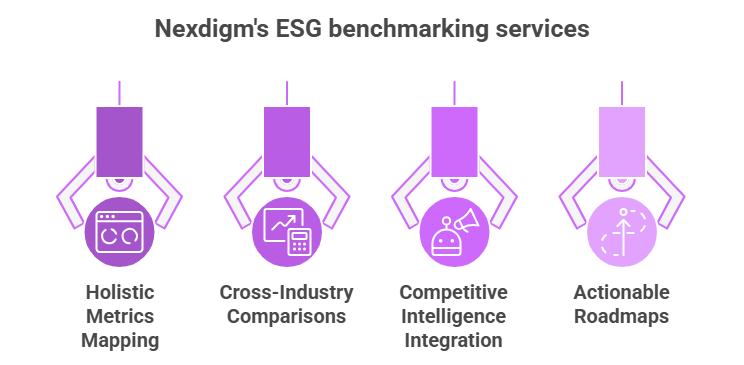Heavy industries such as chemicals and mining are at the center of the global sustainability debate. While these sectors power economies and enable infrastructure, they also face mounting pressure from regulators, investors, and communities to operate responsibly. Stakeholders today are not only asking about production volumes or profitability but also about how companies manage emissions, safeguard workers, and contribute to long-term environmental and social well-being.
In this landscape, ESG performance benchmarking has emerged as a critical tool. By systematically measuring and comparing environmental, social, and governance practices against global peers and industry leaders, companies can identify gaps, showcase transparency, and align growth strategies with sustainability commitments. Far from being a compliance exercise, ESG benchmarking is fast becoming the cornerstone of responsible and resilient growth in heavy industries.
Why ESG Benchmarking Matters in Heavy Industries
For sectors like chemicals and mining, ESG is a defining factor in how businesses are evaluated and sustained. Benchmarking ESG performance helps companies move beyond declarations and measure tangible progress across critical dimensions.
Key Reasons ESG Benchmarking is Critical
- Regulatory Compliance – Comparing emissions, water intensity, and waste management practices ensures alignment with global and local environmental standards.
- Investor Confidence – ESG-linked assets under management have surpassed trillions globally; benchmarking provides the transparency investors demand.
- Operational Efficiency – Sustainable practices, such as reducing energy intensity or improving waste circularity, often result in long-term cost savings.
- Workforce & Community Trust – Benchmarking safety performance, diversity initiatives, and community engagement strengthens an organization’s social license to operate.
- Competitive Edge – Companies with stronger ESG scores often access preferential financing, better partnerships, and enhanced brand reputation.
By embedding ESG benchmarking into their strategy, heavy industry players can balance profitability with responsibility, ensuring that growth today does not compromise tomorrow.
Nexdigm’s ESG Benchmarking Approach
At Nexdigm, we believe ESG benchmarking should be a driver of strategic transformation. Our approach integrates competitive intelligence, data-driven insights, and industry expertise to help chemical and mining companies embed sustainability into their core operations.
How We Deliver Value

- Holistic Metrics Mapping – Covering environmental indicators (carbon footprint, water intensity, renewable adoption), social factors (safety performance, diversity, community engagement), and governance measures (transparency, compliance frameworks).
- Cross-Industry & Multi-Site Comparisons – Benchmarking mines, plants, and business units both internally and against global leaders to identify best practices and performance gaps.
- Integration with Competitive Intelligence – Aligning ESG performance with how competitors are positioning themselves, helping clients maintain parity or build leadership.
- Actionable Roadmaps – Transforming benchmarking data into strategies that enhance compliance readiness, attract ESG-focused investors, and improve operational resilience.
Through this structured methodology, Nexdigm enables heavy industry players to turn ESG from a reporting requirement into a competitive differentiator, paving the way for sustainable and responsible growth.
To take the next step, simply visit our Request a Consultation page and share your requirements with us.
Harsh Mittal
+91-8422857704

